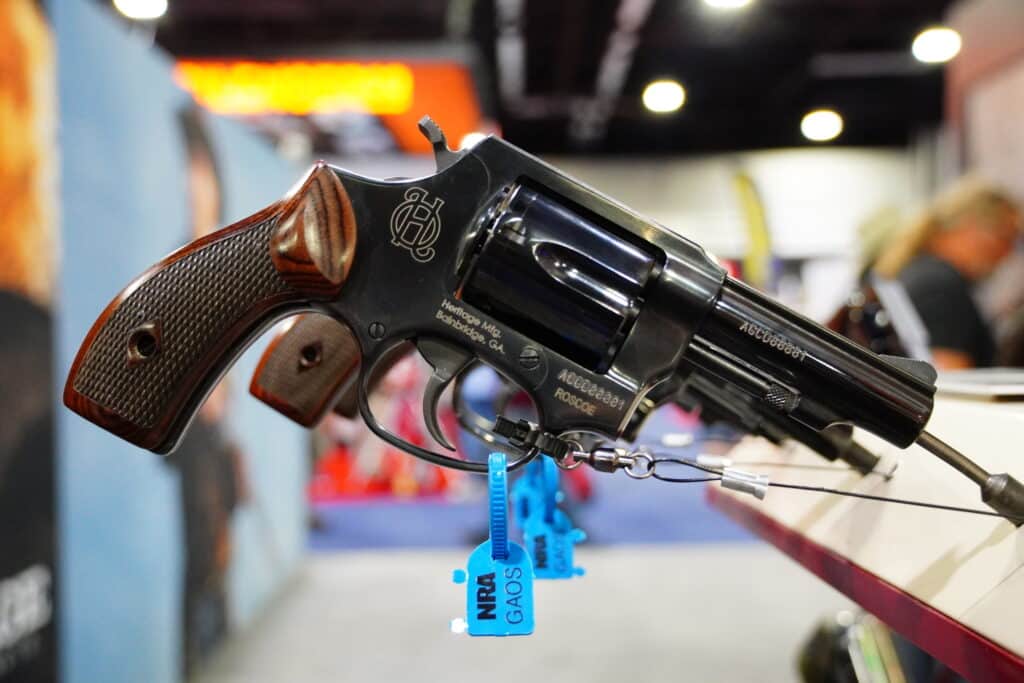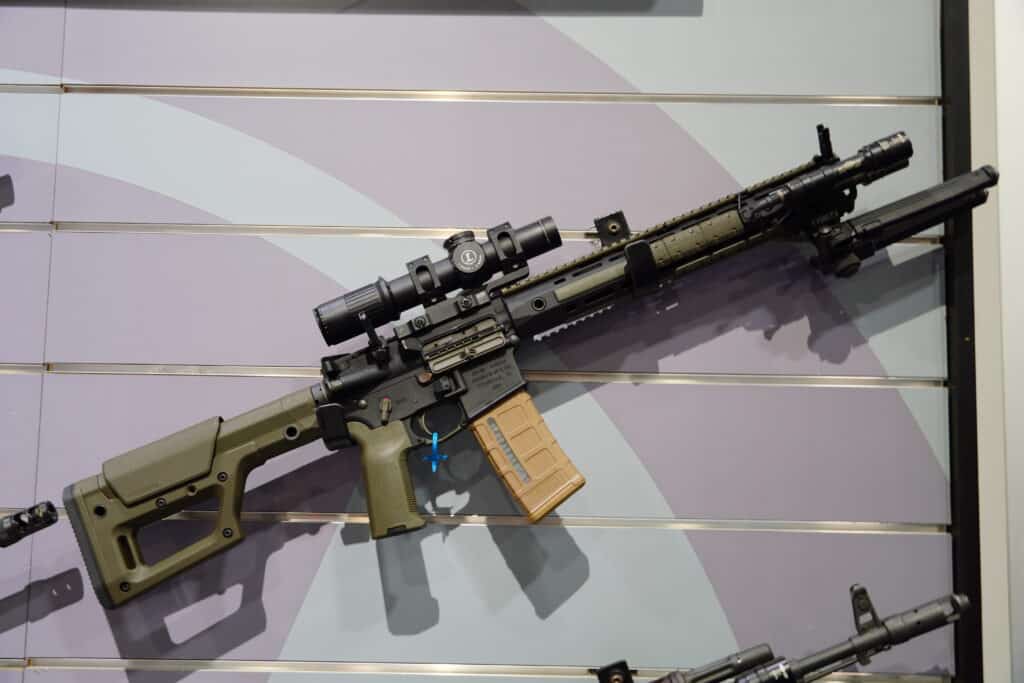Citigroup followed Bank of America in reversing its post-Parkland gun policies this week. Under pressure from gun-rights activists and President Donald Trump, the financial giant pulled back on its pledge not to do business with companies that sell guns to those under 21 or sell “high capacity” magazines at all. Contributing Writer Jake Fogleman looks at the long road from 2018 to today.
The other big news of the week came from the Supreme Court. It cleared its slate of gun cases by denying Rhode Island’s magazine ban case and Maryland’s AR ban case. Then it unanimously tossed Mexico’s liability case against Smith and Wesson.
But, as I explain, it’s the details of those decisions that give us some insight into where the Court may come down on AR and mag bans in the long run. Plus, SCOTUSblog’s Zach Shemtob joins the podcast to dissect the Court’s gun moves.

Analysis: The Big Banks Abandon Post-Parkland Gun Policies [Member Exclusive]
By Jake Fogleman
After years of being on the defensive, gun-rights advocates have successfully turned back the bulk of corporate gun-control policies.
This week saw them notch their most prominent victory to date. Citigroup on Tuesday announced it was ending its policy of severely limiting its business relationships with the firearms industry. The bank previously restricted its services to businesses that sell bump stocks, “high-capacity” magazines, or firearms to adults under the age of 21.
“We will no longer have a specific policy as it relates to firearms,” Ed Skyler, Citigroup’s Executive Vice President of Enterprise Services and Public Affairs, wrote in a post explaining the policy change.
That announcement came on the heels of a similar about-face from Bank of America, which recently rolled back its policy of refusing to do business with companies that manufacture or sell what it considers “military-style firearms.” As a result, two of the three largest banks in the country, in short succession, have now announced their intention to resume normal relations with lawful firearm businesses after a seven-year hiatus.
It’s an abrupt shift that can largely be explained by gun-rights activists learning to take a page from their political opponents’ playbooks when it comes to corporate pressure.
Following the 2018 shooting at Marjory Stoneman Douglas High School, gun-control advocates had tremendous success in bending numerous corporations to their will through public pressure campaigns designed to anathematize the gun industry. Those included banks like Citi and Bank of America, as well as major retailers like Dick’s Sporting Goods and Walmart, which each agreed to stop selling certain semi-automatic firearms or any firearms at all to adults under the age of 21.
The gun-control group Everytown counts more than two dozen major national companies that announced significant policy changes designed to crack down on the presence of firearms or the facilitation of gun commerce in 2018 alone, all in response to the Parkland shooting and subsequent outcry from activists. It was a display of solidarity between the interests of corporate America and a slice of progressive political activists and marked a high point for the gun-control movement’s cultural power, at least in recent years.
That push was met with pushback, however. Spurred by these corporate announcements and numerous instances of gun businesses losing access to banking services for unexplained reasons, gun-rights groups began formulating ways to put their own pressure on financial companies. They did this primarily through legislation cracking down on what they deemed financial “discrimination” against the gun industry.
The resulting policy, first adopted in Texas in 2021, generally prohibits state funds from being invested with financial institutions that discriminate against legal firearms companies. For instance, Texas Attorney General Ken Paxton (R.) invoked the law when he denied Citi the ability to underwrite a $3.4 billion bond deal in the state over its lending stance toward gun businesses. Florida and nine other Republican-controlled states have passed versions of this firearms industry anti-discrimination legislation.
That quickly paid dividends for gun-rights advocates. Bank of America officials specifically cited concerns over the new anti-discrimination laws in Texas and Florida in its decision to walk back its blanket ban on lending to manufacturers of semi-automatic rifles, for example. But now, an even bigger factor giving gun-rights advocates the upper hand in the pressure contest has been the re-election of Donald Trump as President.
Almost immediately after retaking office, Trump used his bully pulpit to pressure America’s financial giants into backing off liberal policies. During a virtual appearance at the World Economic Forum in January, he publicly accused Bank of America CEO Brian Moynihan and JP Morgan Chase CEO Jamie Dimon of “debanking” conservatives.
“The Bank of America, they don’t take conservative business,” he said. “You, Jamie [Dimon], and everybody, I hope you’re going to open your banks to conservatives because what you’re doing is wrong.”
Citigroup evidently heard the President’s message and cited the prospect of him coming after them when explaining their policy flip-flop.
“We appreciate the concerns that are being raised regarding ‘fair access’ to banking services, and we are following regulatory developments, recent Executive Orders and federal legislation that impact this area,” Citi’s Skyler wrote. “In light of those developments, we took an objective look at our policies and practices with the intent of striking the right balance between our commitment to fair and unbiased access to our products while continuing to manage all risks to the bank appropriately.”
Whether additional companies will soon follow suit behind Citigroup and Bank of America in revising their post-Parkland stances remains to be seen. Although their reversals are significant wins for gun-rights advocates, they are just two of the dozens of companies that have chosen to take public stands against their interests. They still have a long way to go to match the pressure campaign success that their opponents have had in recent years.
Being able to count on the President as a megaphone in their push certainly bodes well for their chances, as he’s had swift success in prompting other forms of corporate policy rollbacks to date.
But that isn’t without risk. Just as some government allies, such as New York financial regulator Maria Vullo, pushed beyond constitutional bounds when pressuring companies to adopt policies gun-control activists wanted, the same could happen for gun-rights activists. President Trump has already been accused of pushing beyond those same bounds in numerous other areas, such as his fight with several Ivy League schools.
Additionally, policies discarded in the name of political expedience can just as easily be reinstated once the political winds shift again, and Trump will only be in office for another three and a half years. It’s far from guaranteed that the banks will remain committed to their appreciation for “fair access” to gun businesses under a future, less pugilistic chief executive.
Nevertheless, gun-rights advocates have pressed their agenda in corporate boardrooms to an extent that would have seemed unthinkable back in 2018.
Podcast: SCOTUSblog’s Zach Shemtob on the Court’s New Gun Decisions [Member Early Access]
By Stephen Gutowski
This week, the Supreme Court cleared its slate of gun cases.
It made three substantial moves along the way. First, it finally revealed what it would do with long-languishing cases against Rhode Island’s magazine ban and Maryland’s AR-15 ban. Then, it decided, unanimously, whether Mexico could sue Smith and Wesson over cartel violence.
To break it all down, we have the new editor of one of the premier Supreme Court publications. Zach Shemtob of SCOTUSblog joins the show to give his perspective on what the Court decided and what it means for future cases.
He said Justice Brett Kavanaugh’s statement on the Court’s decision to deny the AR case and his confident prediction it would take a different one up soon was less a signal that Justices John Roberts and Amy Coney Barrett agreed with him and more a message to them. Shemtob said Kavanaugh could be the fourth vote to take up a case at any time and may be trying to convince the two conservative holdouts to come around to his point of view, which clearly favors striking down such bans.
He also said Justice Elana Kagan chooses her words carefully when writing opinions. So, including a line about the popularity of AR-15s in her Mexico opinion may signal a willingness to find they’re protected arms. However, he ultimately argued the liberals on the Court are still unlikely to agree with their conservative colleagues on AR bans.
You can listen to the show on your favorite podcasting app or by clicking here. Video of the show is available on our YouTube channel. An auto-generated transcript is here. Reload Members get access on Sunday, as always. Everyone else can listen on Monday.
Plus, Contributing writer Jake Fogleman and I discuss the big news out of the Supreme Court this week before breaking down Citigroup’s walk back of its post-Parkland gun business restrictions. We also talk about the Department of Justice’s ongoing efforts to defend gun carry among the states, this time targeting Pennsylvania sheriffs who refuse to issue non-resident carry permits. Finally, we discuss the latest monthly gun sales numbers and wrap up with some of the biggest stories from outside The Reload.

Analysis: Did SCOTUS Just Tip Its Hand on AR-15 Bans? [Member Exclusive]
By Stephen Gutowski
Several of the actions the Supreme Court took on guns this week may show where it’s going to end up on “assault weapons” bans.
Certainly, denying cert in Snope v. Brown provides the most straightforward message: the Court isn’t in a rush to rule. But several lines from that denial, as well as one from the Court’s ruling in Mexico v. Smith and Wesson, provide some insight into the intentions of a majority of justices.
Most importantly, we have a statement from one of the justices who voted to deny Snope‘s challenge to Maryland’s ban on the sale of AR-15s and similar firearms.
While three of the conservative justices noted they would have taken up the challenge, three didn’t. It’s likely, especially given Justice Clarence Thomas’s dissent slamming Maryland’s law, that the three who wanted to take the case immediately would strike down the ban. It’s also generally safe to assume the Court’s three liberal members are inclined to uphold it–although, that line from Thursday’s Mexico ruling makes that assumption a bit less safe than we might think.
So, the important question is what will the three in the middle do?
That’s where Justice Brett Kavanaugh’s statement on the denial comes into play. While he apparently voted against taking up Snope, otherwise the Court would’ve had the four votes necessary to do so, he heavily implies the ban is unlikely to pass constitutional muster.
“This case primarily concerns Maryland’s ban on the AR–15, a semi-automatic rifle,” Kavanaugh wrote. “Americans today possess an estimated 20 to 30 million AR–15s. And AR–15s are legal in 41 of the 50 States, meaning that the States such as Maryland that prohibit AR–15s are something of an outlier.”
He argued the rifles are so popular they likely meet the standard for Second Amendment protection set forth in 2008’s DC v. Heller, where the Court first articulated the Constitution protects an individual right to keep and bear arms.
“Given that millions of Americans own AR–15s and that a significant majority of the States allow possession of those rifles, petitioners have a strong argument that AR–15s are in ‘common use’ by law-abiding citizens and therefore are protected by the Second Amendment under Heller,” Kavanaugh wrote. “If so, then the Fourth Circuit would have erred by holding that Maryland’s ban on AR–15s complies with the Second Amendment.”
Kavanaugh even implied that AR-15s are less dangerous on the whole than the handguns the Court has already ruled are protected, because they are also semi-automatic but used less often in crimes.
“For their part, criminals use both AR–15s and handguns, as well as a variety of other lawful weapons and products, in unlawful ways that threaten public safety,” he wrote. “But handguns can be more easily carried and concealed than rifles, and handguns—not rifles—are used in the vast majority of murders and other violent crimes that individuals commit with guns in America.”
He concluded that the Fourth Circuit Court of Appeals decision upholding Maryland’s ban is “questionable.” He emphasized the decision not to take up Snope “does not mean that the Court agrees with a lower-court decision or that the issue is not worthy of review.” He then noted there are several other similar cases circulating in the lower courts, which will give the Supreme Court ample opportunity to address AR-15 bans in the future.
He even went so far as to predict the Court will take up a case relatively soon.
“Opinions from other Courts of Appeals should assist this Court’s ultimate decisionmaking on the AR–15 issue,” Kavanaugh wrote. “Additional petitions for certiorari will likely be before this Court shortly and, in my view, this Court should and presumably will address the AR–15 issue soon, in the next Term or two.”
So, that almost certainly makes four votes to strike down AR-15 bans. The question from there is whether Kavanaugh is speaking strictly for himself or whether his views represent where some of the other justices who voted against taking up Snope come down. Since they’ve been on the Court together, Justices John Roberts, Amy Coney Barrett, and Kavanaugh have voted the same way on all the Court’s Second Amendment cases.
Do Kavanaugh’s words in the Snope denial speak for Roberts and Barrett, too? It’s impossible to say for sure. They didn’t sign on to his statement or make any of their own. They could be undecided on the issue, which would explain why there weren’t four votes to take up Snope if nobody was confident where those two might come down.
However, Kavanaugh’s tone is pretty confident. Instead of just encouraging it to do so, he presumes the Court will take up an AR-15 case and that it will do so soon. That’s an interesting presumption to make if he’s not confident of where the other justices stand.
The other gun case the Court weighed in on this week provides some reason to think even the liberal members of the Court may be open to the idea that the Second Amendment protects the ownership of AR-15s. In Mexico v. Smith and Wesson, the Court unanimously tossed a suit that sought to hold American gun companies liable for cartel violence in Mexico in part because those companies make firearms like the AR-15. The Court, in an opinion written by Elana Kagan, stated as fact that the AR-15 is popular with many law-abiding Americans–a key finding for whether its protected by the Second Amendment under the Heller test.
“As noted above, Mexico here focuses on the manufacturers’ production of ‘military style’ assault weapons, among which it includes AR–15 rifles, AK–47 rifles, and .50 caliber sniper rifles,” Kagan wrote. “But those products are both widely legal and bought by many ordinary consumers. (The AR–15 is the most popular rifle in the country.) The manufacturers cannot be charged with assisting in criminal acts just because Mexican cartel members like those guns too.”
So, in a week where the Court directly denied the opportunity to weigh in on AR-15 bans–allowing Maryland’s to remain in effect as a result–it also provided new reasons to believe it will eventually strike them down.
That’s it for now.
I’ll talk to you all again soon.
Thank you,
Stephen Gutowski
Founder
The Reload







